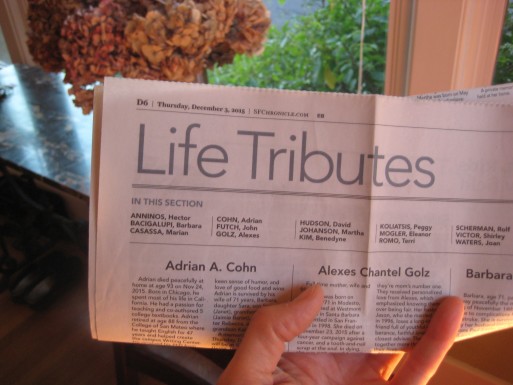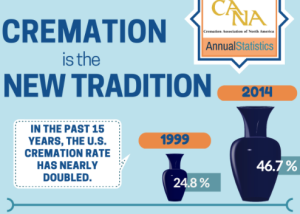 You may not have noticed, but as we move our viewpoint to a more natural way of thinking about death, our language is also following along. I just bought an old school hard copy of the SF Chronicle, and I could not help but notice the heading “Life Tributes” had replaced the old standby “Obituaries.” I’m not surprised. After all, the word “obituaries” brings up stodgy, stifled thoughts of darkness attached to death, while “tributes” speaks of memory — of the lightness of paying respect to the real person who was. And wouldn’t you rather evoke sun-streaming beauty rather than darkness around the memory of your loved one at the end of life?
You may not have noticed, but as we move our viewpoint to a more natural way of thinking about death, our language is also following along. I just bought an old school hard copy of the SF Chronicle, and I could not help but notice the heading “Life Tributes” had replaced the old standby “Obituaries.” I’m not surprised. After all, the word “obituaries” brings up stodgy, stifled thoughts of darkness attached to death, while “tributes” speaks of memory — of the lightness of paying respect to the real person who was. And wouldn’t you rather evoke sun-streaming beauty rather than darkness around the memory of your loved one at the end of life?
OK, I admit that not all newspapers have made this language change, but I see the beginning of a shift that is affecting all aspects of the dying process. On the BBC News, I read the headline ”Christopher Hitchens Dies at 62 after suffering from cancer.” Note — he did not “pass away.” While this is only one example of many, the fact is that more and more we are foregoing euphemisms for the reality of what life brings. And death is something that will happen to all of us. By altering our viewpoint (and language) death transforms to a beautiful part of life that we no longer fear.
The Internet also gives us clues as to how far we have come in our approach to death. In 2008, Tributes.com launched its site. It is now one of the two largest websites in the United States for – well, life tributes. The other, Legacy.com, is still on the old “obituary” bandwagon, but hopefully that will change soon. As fewer people opt for hearses and traditional funerals, we won’t need those wagons anyway. With the cremation rate at 47 percent, cremation urns are now a more popular choice, and scattering loved one’s ashes into bright sunlight is replacing burial. No wonder the Cremation Association of North America appropriately calls cremation “the new tradition.”
As we experience this tipping point in our approach to death, our chosen language will tip too.

 As We Change Our View of Death
As We Change Our View of Death



 Passing of Beloved Comedian Births a New Comedy Festival
Passing of Beloved Comedian Births a New Comedy Festival

 The Spiritual Symbolism of Cardinals
The Spiritual Symbolism of Cardinals














